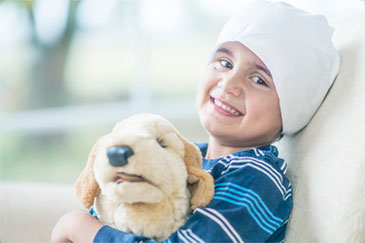- Home
- Research & Data
- POGO Research Unit
POGO Research Unit
Research is essential for improving the health and outcomes of children with cancer.
POGO established the POGO Research Unit (PRU) in 1996 to focus on research that contributes to a better understanding of childhood cancer and its impacts, and improved outcomes for children with cancer and their families. The PRU partners with institutions throughout the province and beyond to promote multidisciplinary, multi-institutional health research activities that:
- Enhance our understanding of the causes of childhood cancer
- Inform policy development
- Align resources with research needs
- Diminish the impact of childhood cancer on children, families and society
Led by a steering committee comprised of academic, scientific and thought leaders, the POGO Research Unit focuses on four pillars of scientific inquiry:
- Epidemiology
- Health Services Research
- Economics
- Survivor Status/Quality of Life
Epidemiology
- Epidemiology, including environmental and molecular interactions, especially relating to those cancers of changing incidence in childhood
- Disease distribution by cluster analysis
- Trends analysis and projections, notably in regard to the anticipated increment in incidence and projections of resource utilization
- Disease, treatment, sociological and system determinants of clinical outcomes
Health Services Research
- Evaluation of innovative developments and determinants of success in health care delivery
- Evaluation of practice guidelines
- Studies of knowledge transfer – from science to care delivery and policy, and from the professional to the public realms
- Study of the application of new technologies to childhood cancer care
Economics
- Investigation of existing methodologies for estimation of costs attributed to childhood cancer, and development and application of new measures
- Study of cost, cost effectiveness, and cost benefits of differing forms of therapy for similar diseases
- Studies of the economic burden of illness on children and families
- Comparison of costs of programs delivered in different settings
Status of Survivors/Quality of Life
- Investigation of short- and long-term health outcomes
- Measurement of health status and health-related quality of life during and after therapy
- Identification and study of interventions intended to alter long-term health status including preventive strategies and health promotion interventions
- Assessment of family coping and survivors’ late effects
Find out about our grant competitions and funding opportunities for childhood cancer researchers.
Related Articles
How Slushies and Red Lights Provide Supportive Care for Childhood Cancer Patients
April 3, 2024
About a decade ago, I sat in a hospital in Leeds, Yorkshire, discussing with the parents of one…


YOU can be a champion for kids with cancer!
With your help, we will ensure that kids and youth with cancer, their families and survivors of childhood cancer have equitable access to the best care for the best possible outcomes.